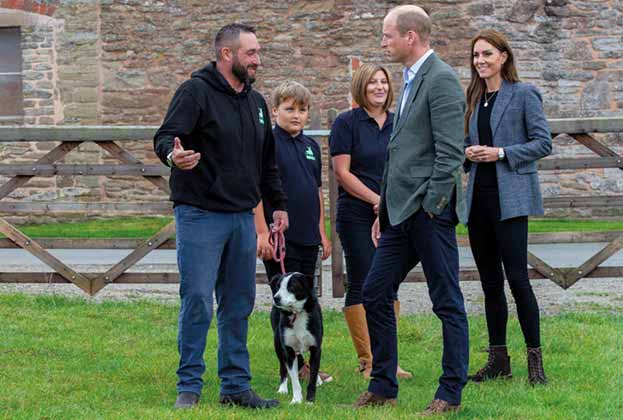Enhancing the social impact of an estate or farm can benefit landowners, land managers and society as a whole
People power
The focus of this Spotlight is social value and what that means in a rural context. We will demonstrate how identifying, recording, enhancing and communicating the social value of a farm or an estate can benefit landowners and managers and, in turn, improve social value for society.
We provide insight into what one large estate is doing to maximise its social impact and we explore how social value can improve the well-being of rural communities and generate economic growth.
What is social value?
It’s all about people. People who live, work, visit a farm or estate as well as people who currently don’t. It’s about making decisions that meaningfully consider the social impact on all these people – their health and well-being, their quality of life and longer term, the creation of positive life outcomes.
Since the rise of ESG (environmental, social and governance), through which businesses consider their impacts upon the world, the audience for social value has changed considerably and so has its purpose. It is clear that there are many opinions of what social value is, but equally, there is an acceptance that a singular definition is unimportant. What is important is that what we are measuring, monitoring or reporting is transparent and understood by the audiences.
Social value is a broader understanding of value. It moves beyond using money as the main indicator of value, instead putting the emphasis on engaging people to understand the impact of decisions on their lives. The people’s perspective is critical
Social Value UK
For some time, optimistic thinkers have urged governments to embrace an alternative to the economic metric gross domestic product (GDP) as a measure of human progress. The creation of the Social Progress Index (SPI) has gone some way to doing this and is the first holistic measure of a country’s social performance that is independent of economic factors.
The SPI measures the extent to which countries provide for the social and environmental needs of their people, using 60 indicators of basic human needs, foundations of well-being and opportunity to progress.
In 2024, the SPI showed that the UK ranked 21st in the world and had lost a decade of social progress. While governments and markets continue to refine the precise definition of social value, this Spotlight will demonstrate how the rural sector can play a role in its provision.
Why now?
Social value has gained significant momentum over the last few years and now sits at the top of the agenda for many organisations. This has not been driven by policy change or regulation. Ultimately, this is because businesses, as well as individuals, are recognising the importance of creating a positive social impact not only for ethical reasons but also for long-term sustainability and success in delivering economic growth.
Why is it important to review the social impact of land and property ownership?
The indirect positive economic impacts delivered by farms and estates to society are often significant, but have not always been acknowledged by key stakeholders, consumers or even landowners themselves.
Examples include money recirculating through local supply chains, job creation, affordable housing provision, environmental benefits, such as the restoration of natural environments, well-being benefits and the provision of communal amenities, such as libraries, cricket pitches, playgrounds and community spaces, which host communal events such as harvest festival. Societal expectations are changing, making the engagement of estate owners and land managers with their communities, neighbours, employees and tenants highly important. Understanding the true impact and value of land ownership, as well as how it is managed, is critical if we are to navigate the expectations from society relating to climate, nature and any future social legislation.
Landowners and managers play a key role in shaping places, often over many generations
In many cases, simply by communicating what they are already doing, there is an opportunity for landowners, land managers and rural businesses to create tangible social contributions that will positively impact the whole community. The financial and wider value of rural land can be maximised through increased local engagement, which can improve the attractiveness of rental properties and create places where people want to live and work.
Savills is aware of some estates that have become renowned for the level of service they provide to their tenants, both residential and commercial. There are waiting lists for homes to rent and commercial units, all driven by the local knowledge of the level of quality and service that such estates offer above and beyond their building structures. Estates can develop a good, strong brand by delivering a high-quality service across their assets, which can increase rents, decrease voids and create a real community of tenants, who will, in turn, widely sing the praises of the estate.
Enhancing social value can provide opportunities to improve an organisation’s reputation, leading to increased footfall or demand. More weight is also being applied to social value in the planning process, so projects with a strong social benefit are more likely to succeed.”
Demands for information on the impact and accountability of rural land ownership are increasing
Historically, UK agriculture has been focused on food production, but the government’s agricultural policy transition towards “public money for public goods” has accelerated discussions about how food production interacts with the natural environment, ecosystems and society. Stakeholders are becoming more empowered and concerned about sustainability and climate change. Farmland is frequently held up as a solution in the fight against climate change and biodiversity loss. As a result, public authorities, policymakers and consumers are increasingly demanding information on the impact and accountability of rural land ownership.
In 2021, the UK government made it mandatory for certain businesses to comply with the Task Force on Climate-related Financial Disclosures (TCFD). Listed businesses, financial organisations and “large asset owners” are now required to record and publish their scope 1, 2 and 3 greenhouse gas emissions.
Furthermore, a new set of global disclosures was announced in September 2023, known as the Taskforce on Nature-related Financial Disclosures (TNFD). This framework requires organisations to disclose their nature-related dependencies and impacts across their entire value chain.
Many farms are outside the scope criteria and not directly impacted by TCFD and TNFD, but are increasingly being asked for information on carbon and climate risk from their own customers and suppliers who are reporting against these metrics. We can only assume that reporting on social value output is a potential next step.
Social accountability around land ownership has been a prominent topic in Scottish politics for some time, and there is now a greater expectation that it forms part of decision-making in England and Wales. This raises two questions: will the government, and potentially supply chains, ask farm and estate businesses for information on social accountability and, if so, when?
The UK government already requires that social value is considered as part of the tender process for many of its biggest outsourcing contracts. The government awards up to 10% of marks for social value under the Public Services (Social Value) Act 2012. Again, we anticipate that social value reporting will become an expected element of business terms as it gains traction and is demanded by wider markets. An early sign of this transitioning to rural estates is the move by The Church Commissioners for England to make its company management accountable to its investor expectations on human rights.
.jpg)
SAVILLS FOUR PILLARS OF PEOPLE
When delivering social value, it is essential to identify all associated stakeholders and people impacted both within and outside of the business. Savills analyses who these stakeholders should be through its four pillars of people (figure 1). These represent the different levels of interaction and allow businesses to assess the social value an asset is providing and work out ways it could be amplified. Typically, pillars one and two (people who live and work on the estate or farm) are the main focus of social strategy and will be directly impacted by any improvement in social value.
These groups of people are termed as “fixed social value” because their engagement with the asset is a given. The third pillar focuses on people who access a farm or estate through public routes, and the fourth pillar focuses on people who would not typically access the farm or estate. The people within the latter two pillars are often given little consideration, but when the needs of the people within pillars three and four are considered this sends a clear message that a business is actively working to improve its social value. The scope to improve social value for people within pillars three and four is often greater than for those in pillars one and two.
Read the articles within Spotlight: Social value in a rural context below.



